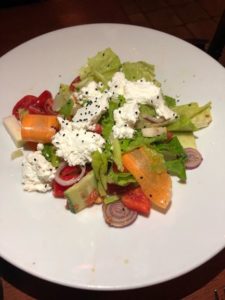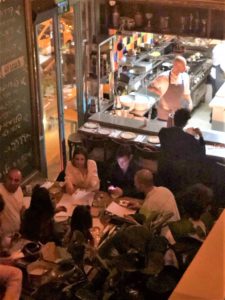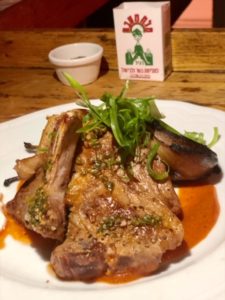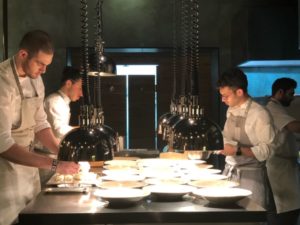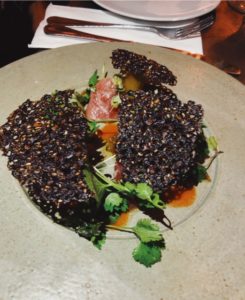For most people, a trip to Israel is a spiritual journey filled with visits to holy sites and fascinating firsthand looks at biblical history. But I’ve been there, done that. Several times. My recent trip to Israel has an entirely different priority. It’s all about exploring Israeli cuisine.
This isn’t to say we neglect tourism entirely. We make a very brief visit to the Western Wall on Shabbat. We spend an entire day at the Israel Museum. And we walk for miles to enjoy a panoramic view of Jerusalem’s Old City before heading off to Tel Aviv for the bulk of our vacation. Here we stroll through neighborhoods like Neve Tzedek, Jaffa, and the Port, and take walks along Gordon Beach each day. But the food….
My previous trips to Israel have been over Passover or on organized tours where what we eat isn’t in my control. This visit is a full-on food fest. We visit markets- guided and on our own, partake in a culinary experience at a private home, enjoy street food and fine dining. While much of our dining is at non-kosher restaurants, we also discover how kosher restaurants have been transformed in the 9 years since our last visit.
What we find – predominantly in Tel Aviv but also in Jerusalem- is an elevated food scene. I’m talking biblical proportions here. Israel is now a dynamic dining destination. Chefs take advantage of fresh, local, ingredients and spices commonly associated with Israel and the Middle East and weave them into artistic, technique-driven dishes with influences from around the globe.
This post highlights the traif (non-kosher) restaurants from our dining itinerary. A kosher post will be coming soon.
Shanty, Nahalat Shiva 4, Jerusalem
We arrive in Jerusalem on a Friday, just as the sun is setting. It’s our first night in Israel and staying awake with an overnight flight and 7-hour time difference is a challenge. Despite travel fatigue, I’m not going to miss out on a dining opportunity. Jerusalem is a challenge on Shabbat, but I’ve come prepared with a list of restaurants that are open. Not prepared enough. It turns out that most are fully booked. Despair begins to set in, and its magnified by my weakened state. The concierge at our hotel* comes to the rescue. She directs us to Shanty, just blocks away in the Nahalat Shiva neighborhood outside the Old City.
*This is our second stay at the Harmony Hotel on the lively Yo’el Moshe Salomon Street. We are obsessed with their sumptuous kosher Israeli breakfast buffet.
Shanty has withstood the test of time in many ways. The restaurant is situated in a century-old Jerusalem stone house, which was transformed into a dining establishment in 1992. There’s old-world appeal and a lived-in feeling that fits the environment. The menu from Chef Alon Sela is seafood-centric. I’m hesitant about ordering shrimp on Shabbat in Jerusalem, but I can’t resist. Linguine with shrimp and sun-dried tomatoes is simple but skillfully prepared.
I pair it with a bright salad topped with creamy goat cheese so fresh I wonder if the goat is grazing nearby. It’s a win on night one of our vacation.
As the meal concludes our server offers my husband and I whiskey shots and joins us in a toast. This is a gesture that’s repeated several times during our trip. I can’t help but wonder about the consequences of restaurant staff doing this multiple times throughout an evening shift. Another puzzling custom: toothpicks and hand wipes delivered during or after every meal- fine dining or casual. A few times we begin to think a restaurant has bucked the trend, and then they appear as if part of some unwritten law. Or maybe it is written?
—–
Machneyuda, Beit Ya’akov St 10, Jerusalem
My reservation confirmation from Machneyuda comes with a warning: It Is important that you know , the restaurant is not Kosher and the music is very loud during the service.
My reply is one word: AWESOME.
Machneyuda with its open kitchen and enthusiastic patrons is indeed boisterous, but the cacophony is what makes it one of the most exciting restaurants in Jerusalem. Patrons sing, trill, and clap to Israeli rock music. The energy inspires a uniquely uplifting dining experience.
Chef/owners Assaf Granit, Yossi Elad, and Uri Navon purvey most of the ingredients from the adjacent Mahane Yehuda market. They weave the Israeli-grown products into an eclectic and worldly mix of dishes.
While the patrons sing, so does the food. The menu changes daily based on market availability. On our visit it includes yellowtail carpaccio with pineapple; New York steak with cauliflower, chimichurri and mashed potatoes; and Foie gras with brioche, Jerusalem artichoke cream, and Amarena cherries.
Veg-Saigon eggplant “tacos” with ginger-lime dressing are feisty and complex, not unlike the Israeli people.
Lamb T-bone with mnazaleh (chickpeas, tomato, and eggplant), romesco and burnt onion glistens with possibility…and delivers.
Banufi pie, an English dessert of bananas, cream, and toffee is a terrific conclusion.
Machneyuda is the answer to my prayers in the Holy Land.
—–
OCD, 17, Tirza st. Tel Aviv
We have our favorite meal of the entire year at OCD in Tel Aviv. This is significant, as we indulged our food fantasies by dining at multiple Michelin-starred restaurants in Portugal earlier this year.
OCD appears on every best restaurant in TLV list. It’s an “absolutely-must-eat-here-or-I’m-not-leaving- the-country “on my to-do dining list.
Nineteen diners are seated around a counter where we are eyewitnesses to Chef Raz Rahav and his team as they prepare our 13-course tasting menu.
I assume that OCD has some special meaning in Hebrew. When I ask for an explanation, I’m surprised at the response from one of the servers: “Chef Rahav has this disease…”
The chef’s intensity, focus, and attention to detail is evident as you watch him work. It translates to a panoply of refined dishes that are striking to look at and thrilling to taste. Tweezers and squirt bottles play a leading role, and while sometimes too much technique can feel gimmicky, at OCD it never feels overdone.
Standout dishes include steamed seabass with corn, tomatoes, and nasturtium; duck with zucchini squash, grapes and mizuna leaves; and Parkerhouse rolls with whipped tomato cream. Each course is a study in textural contrasts and vibrant flavors.
The meal here is under $100 per person, an incredible value for a world-class meal.
Service is gracious but restrained. If I worked here, I think I’d be shouting with enthusiasm. I’m more than happy to do my part from the other side of the counter.
Dietary restrictions can be accommodated including vegetarian, pescatarian, vegan, and kosher-adapted (no pork and no shellfish).
—–
Mashya, 5 Mendeli St. Tel-Aviv (Mendeli St. Hotel)
When Israelis who are knowledgeable about Tel Aviv restaurants hear that we going to Mashya, they nod approvingly. My decision to dine here doesn’t come lightly. The restaurant is featured on the Tel Aviv episode of “Somebody Feed Phil” which initially puts it on my radar. The cuisine by Chef Yossi Shitrit is Israeli with a Moroccan accent. Mashya is built around the theme of nature, which is evident in the décor and food presentation. Favorite touches: a wall of greenery, and frenna bread with 18 spices presented with tree branches woven through the center of the loaf.
If we can name all the spices, the bread is comped, says our server. An impossible task. We focus our energy on dipping the warm bread in an array of accompanying dips.
Tender lamb and beef kabobs are blanketed by crispy phyllo dough. The meat is redolent with spices, the scent escaping through the thick pastry the moment the server breaks through the crust with a knife. It’s a hearty serving, which I can’t begin to tackle. Is it okay for a manager to come by our table to express concern that I didn’t finish my entrée? Or is this appropriate because we are in a restaurant in the Jewish state?
My husband realizes that many non-kosher restaurants in Israel use kosher meat. We confirm this here, and he enjoys roasted duck breast (which is translated on the menu as duck chest), with risotto, raw tahini, and almond milk.
The food is flawless, but serious service issues leave a bad taste in our mouth. Some of our frustrations may be based on cultural differences related to service, however we expect more when it comes to fine dining. Mashya is revered by many, but for us there is something lost in translation.
—–
Milgo Milbar, Rothschild Boulevard 142, Tel Aviv
It’s Friday night. We are in Tel Aviv. We have reservations at Milgo Milbar, a last-minute addition to our itinerary. We welcome the chance to dig into another one of the city’s modern Israeli restaurants.
We head out early, allowing enough time for a final shopping spree. I’m surprised to find – in this predominantly secular city- that stores close early on Friday afternoon and don’t reopen until Sunday. At 7:00 pm the streets are quiet, and so we arrive at Milgo Milbar 45 minutes ahead of our reservation. They offer us temporary seating at the counter overlooking the open kitchen. This is my favorite seat in any restaurant. I’m delighted we can begin our experience here, as we are ultimatey moved to a counter overlooking the check-in desk and a coat rack. Not as much fun.
Still this meal- at one of the few restaurants that didn’t take me hours to select- is the sleeper hit of our vacation.
White fish sashimi with chopped charred vegetables, chili, leeks and black sesame tuile is stunning, with bright flavors and an amalgamation of textures.
Buche cheese tortellini is eye-popping and tastes as good as it looks- blending okra, tomato, egg, and beurre blanc sauce.
Seafood from Chef Moti Titman stands out at Milgo Milbar. Drum fish filet highlights Asian flavors, and whole baked sea bass is supplemented by okra, cherry tomatoes, broccoli and spinach.
Chef Moti Titman is considered a celebrity chef in Israel. I don’t have to be distracted by celebrity personas in a country where I’m mostly unfamiliar with who’s who. It’s refreshing for me to let the food be the only shining star.
—–
Miznon, King George Street 30, Tel Aviv (other locations in Tel Aviv, Paris, and New York)
In both Tel Aviv and Jerusalem you can eat at a fabulous fine dining restaurant one night, and enjoy equally satisfying street food the next. On the street food front, all signs point to Miznon.
Miznon is another celebrity chef venture, this one from Eyal Shani who owns numerous well-respected restaurants in Tel Aviv including Port Said, Abraxas North, Salon Romano, and HaSalon).
Miznon is about stuffed pita filled to the brim with savory meat and vegetables. There’s a sauce bar with tahini, zhug (spicy green sauce) and pickles. One dish that has been touted as a must is whole roasted cauliflower, charred, and primed for dipping. This simple vegetable has the power to attract crowds. It’s somewhat mystifying but we devour it in moments, just like every other patron at Miznon.
Speaking of crowds, at 3:00 pm a Saturday afternoon, Miznon is packed. There’s a frenetic energy behind the counter, while patrons wait somewhat impatiently for food (or is that just me) ? In the meantime, pitas appear on the counter for the taking and disappear almost immediately. Israeli rock music blares, customers jostle to place orders and pick up food, and it’s all great fun.
Can’t make it to Tel Aviv? Miznon opened this year in Chelsea Market in New York.
Note: I am greatly disappointed that we don’t have time for Eyal Shani’s notable restaurant HaSalon. I just discovered he will be opening an outpost in New York in Spring 2019.
—–
Atalya
She’s a private chef. She’s a storyteller. She’s the Winner of the 2016 Gourmand World Cookbook Award. She’s Atalya.
Atalya offers a variety of culinary experiences including food tours and cooking classes for groups. We are fortunate to snag a space in one of the weekly Friday brunches she hosts at her home in Ein Kerem outside of Jerusalem. The experience begins on the rooftop of her storied home, with a magnificent view of the Judean hills.
She hosts 20 guests for a spread that includes pastries, shakshuka, salads, cheeses, quiches, breads, and home-made condiments. Many of the ingredients are locally grown and some are accompanied by fascinating stories related to her discoveries of the growers or producers.
Fellow guests hail from countries around the world who share a passion for food. We are enthralled as Atalya describes the journey which brings her back to living and cooking in the house where she grew up. It’s a pleasure to relax, and at the same time be energized by this spell-binding experience.
Atalya should have her own cooking show. It could be called Bake. Blend. Stir. Fry. In the meantime, enjoy this Culture Trip video of Atalya discussing and making shakshuka, Israel’s beloved breakfast dish.
—–
A Few of my Resources for Restaurant Research
Bloomberg-Israel’s Best Restaurants by Ottolengi and Eyal Shani
Haaretz – The 20 Best Restaurants in Israel Right Now (June 2018)
Netflix: “Somebody Feed Phil” Tel Aviv
For more, see my post Kosher Dining in Israel: Holy Satisfying for Jewish Food Experience

